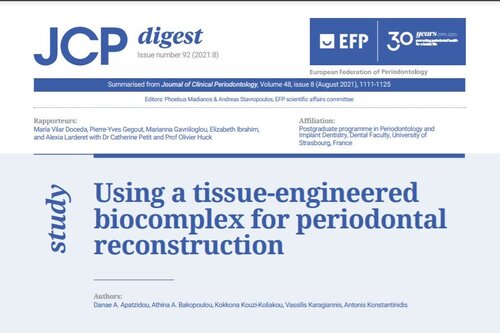![]()
5 October 2021
Tissue-engineered biocomplex shows promise in periodontal reconstruction
Categories:Clinical Practice, Communication

An alternative therapeutic strategy for regenerating intrabony defects, using a tissue-engineered biocomplex, has shown promising initial results.
As reported in JCP Digest 92, a prospective, controlled clinical trial involving 27 patients explored a novel therapeutic strategy based on using autologous bone marrow mesenchymatous stem cells (a-BMMSC) and autologous fibrin/platelet lysate (aFPL), incorporated in a collagen fleece/scaffold. The study evaluated both the clinical efficacy and potential side effects of this approach.
All patients had been diagnosed with advanced periodontitis and had at least one intrabony defect where both the probing pocket depth and loss of clinical attachment measured at least 6mm, and an intrabony component of at least 3mm with no radiographic evidence of endodontic/furcation involvement that required surgical intervention.
The trial found that the biocomplex was well tolerated and had the advantage of being able to fit into any type of bone defect. Researchers also suggested that this bioengineered tool might promote healing through the modulation of local inflammation and the stimulation of the local host cells.
However, they said there were drawbacks to this technique, notably its cost, the preparation time involved, and the logistics. Researchers said that more studies were needed with a larger sample size and involving more complex defects to obtain more accurate results.
The study, published in the August edition of the Journal of Clinical Periodontology, was summarized for JCP Digest by students of the EFP-accredited postgraduate programme in periodontology at the University of Strasbourg in France.




